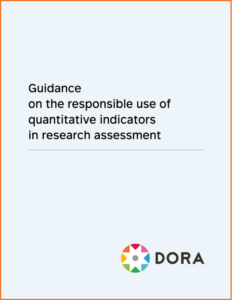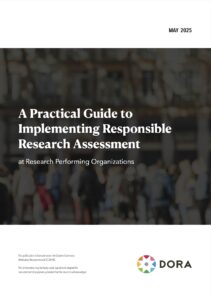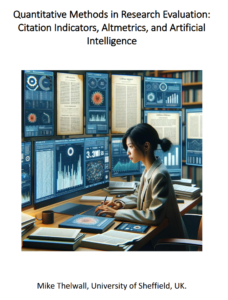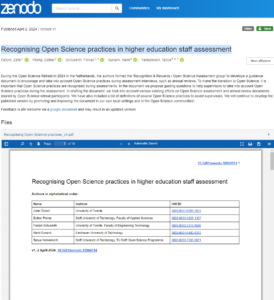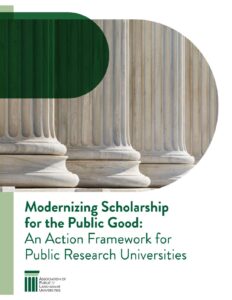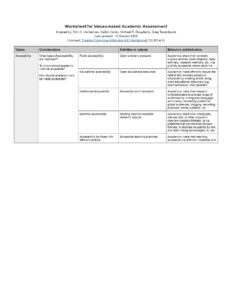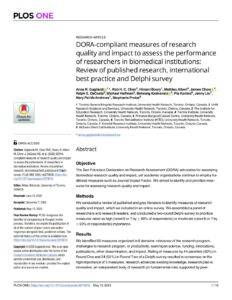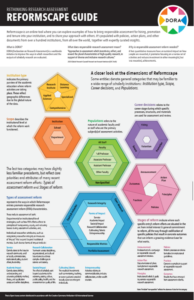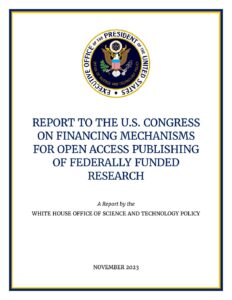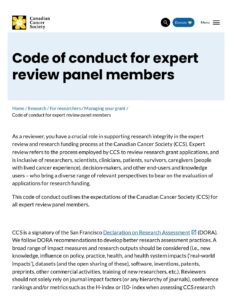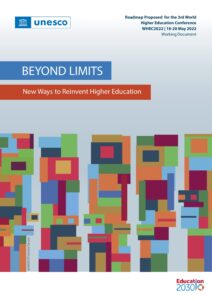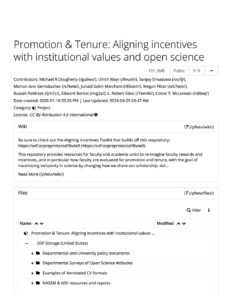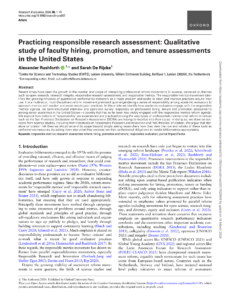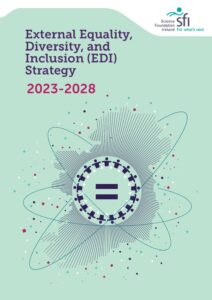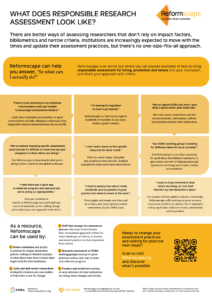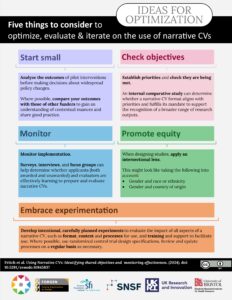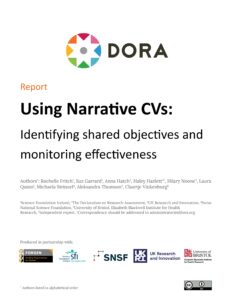A collection of materials to facilitate the development of responsible research and researcher assessment policies and practices.
Search and Filter
Resource type
Intended audience
Advocacy resourcesPolicies and guidancePosition papers
DORA-produced
For: FundersJournals and publishersProfessional societiesResearch institutesResearchers
2024
This document provides guidance on the use of several indicators (sometimes called metrics) used in research assessment: the Journal Impact Factor and other measurements of journals, citation counts, h-index, field-normalized citation indicators, and altmetrics. Five principles guide the use of these metrics: be clear, be transparent, be specific, be contextual, and be fair.
Advocacy resourcesPolicies and guidanceTools
DORA-produced
For: Research institutes
2025
"A Practical Guide to Implementing Responsible Research Assessment at Research Performing Organizations" provides action-oriented guidance, resources, and illustrative examples, for research performing organizations (RPOs) who are looking to shape and deliver responsible research assessment (RRA) practices. This includes RPOs who are looking to create an RRA strategy, organizations wanting to reform existing practices, and organizations simply wanting to take steps towards more holistic and inclusive approaches to research assessment.
Advocacy resourcesTools
For: FundersProfessional societiesResearch institutesResearchers
2025
These short educational videos in animated and talking head formats provide an introduction to the h-index, a commonly used scholarly metric for assessing authors’ publication output and citation impact. The videos explain how the h-index is calculated, how it is used to assess researchers, and its key limitations. They highlight important considerations, such as disciplinary…
Advocacy resourcesInitiativesTools
For: FundersJournals and publishersResearch institutes
This book critically analyses the value of citation data, altmetrics, and artificial intelligence to support the research evaluation of articles, scholars, departments, universities, countries, and funders. It introduces and discusses indicators that can support research evaluation and analyses their strengths and weaknesses as well as the generic strengths and weaknesses of the use of indicators…
Good practicesPolicies and guidance
For: FundersResearch institutes
2024
This resource compiles questions about open scholarship that pertain to assessment of research, education, outreach, and leadership. The questions for each section are accompanied by definitions of terms used in the questions and links to resources. The authors note that these questions were developed in the context of assessment practices in The Netherlands, but note…
Good practicesPolicies and guidance
For: FundersResearch institutes
2020
This resource compiles questions about open scholarship that pertain to assessment of research, education, outreach, and leadership. The questions for each section are accompanied by definitions of terms used in the questions and links to resources. The authors note that these questions were developed in the context of assessment practices in The Netherlands, but note…
Good practicesInitiatives
For: Research institutes
2023
For over 150 years, public research universities have advanced public interest through education, innovation, and community engagement. The Association of Public and Land-grant Universities (APLU) has created an initiative to promote the continuation of these values while modernizing them to give a greater consideration to diversity, equity, inclusion, and justice. A subsection of this initiative…
Tools
For: Research institutes
2023
This worksheet was created as a guide for academic institutions and departments to aid in modernization of their promotion, tenure, and review processes. It lays out a set of values that institutions can take into consideration during evaluations, and offers considerations, activities or outputs that may be associated with each value, and behavioral indicators that…
Good practicesJournal articles
For: Journals and publishersResearch institutes
2023
This paper reviewed existing literature and international best practices and established consensus by Delphi survey on 10 key measures for assessing research quality and impact that align with DORA values. These measures were chosen from a pool of 50 compiled measures that emphasize diverse and holistic evaluations of research performance beyond traditional metrics like journal…
Good practicesJournal articles
For: Research institutes
2024
This paper examines how to appropriately recognize and reward quality research. It critiques the overreliance on traditional quantitative indicators like journal impact factor and citation counts in evaluating scientific achievements. These metrics often fail to capture the true value and impact of research and can lead to undesirable behaviors that hinder scientific progress. The authors…
Policies and guidanceTools
DORA-produced
For: Research institutes
2024
A one page tool that describes the six ways that entries are characterized in the Reformscape dataset. 1. Institution type. 2. Scope. 3. Populations. 4. Career decision. 5. Type of assessment reform. 6. Stages of reform. Part of "Rethinking research assessment" series.
Good practicesJournal articles
For: Journals and publishersResearch institutes
2024
This paper explores the relationship between open access (OA) publishing and citation diversity, offering insights into how accessibility shapes scholarly communication. Regarding responsible research assessment, open scholarship is largely important, helping to evaluate work on its own merits when it is openly accessible. The authors determined that freely available scholarly publications attract citations from a…
Good practicesPolicies and guidance
For: Journals and publishersResearch institutes
2023
This report from the White House Office of Science and Technology Policy (OSTP) discusses financing mechanisms for open access publishing of federally funded research. Overall, the report underscores the importance of financing mechanisms to support open access publishing of federally funded research, emphasizing the need for continued efforts to ensure broad access to scientific knowledge…
Good practicesPolicies and guidance
For: Journals and publishersResearch institutes
2023
Reviewers play a critical role in upholding research integrity within the expert review and funding process at the Canadian Cancer Society (CCS). The expert review encompasses a diverse group ranging from researchers, clinicians, patients, survivors, caregivers, decision-makers, and knowledge users, collectively offering a multifaceted evaluation of research grant applications. In alignment with DORA, CCS advocates…
Advocacy resourcesGood practicesPolicies and guidance
For: FundersProfessional societiesResearch institutes
2022
This document from UNESCO is a roadmap for higher education, prepared for the “3rd World Higher Education Conference (WHEC2022).” Within the roadmap are “signposts for co-creating more open, inclusive, equitable and collaborative higher education systems that democratize access and knowledge.” Recognizing the evolution of and advancements in higher education, UNESCO has outlined 5 sections discussing…
Advocacy resourcesGood practicesInitiatives
For: Research institutes
2020
This repository contains resources for faculty and academic units that are working to transform how faculty are rewarded and evaluated for promotion and tenure, with the aim of promoting inclusivity via open science practices. This “Impact as Access” approach entails access to all aspects of research, including data sharing, direct involvement in research, and access…
Initiatives
For: Professional societiesResearch institutes
2021
The Global Research Council (GRC) Responsible Research Assessment (RRA) working group, was established in 2021 to support the promotion and implementation of RRA practices in the international research and innovation system through the development of a collective understanding of RRA, and the sharing of guidance and best practices between research funding agencies worldwide. With a…
Advocacy resourcesGood practicesInitiatives
For: Research institutes
2022
The More Than Our Rank scheme and SCOPE Framework for Research Evaluation, launched by the International Network of Research Management Societies Research Evaluation Group (INORMS REG), are initiatives that both have a focus on equity in academia and research. More Than Our Rank aims to address the limitations of global university rankings and encourage academic…
Good practicesJournal articles
DORA-produced
For: Research institutes
2024
This paper investigates the processes and criteria involved in faculty hiring, promotion, and tenure assessments within academic institutions in the United States. Considering the relative size of the United States and its worldwide standing in academic research, there has been less public commitment to reforming research assessment from American research institutions than in similarly positioned…
Good practicesInitiativesTools
For: FundersProfessional societiesResearch institutes
2024
The Young Universities for the Future of Europe (YUFE) Transforming R&I through Europe-Wide Knowledge Transfer (YUFERING) project is a comprehensive initiative aimed at transforming Research and Innovation (R&I) practices across Europe by facilitating widespread knowledge transfer. It seeks to bridge the gap between researchers, innovators, and stakeholders by promoting collaboration and communication through existing networks…
Good practicesInitiativesPolicies and guidance
For: FundersResearch institutes
2023
Science Foundation Ireland’s (SFI) Equality, Diversity, and Inclusion (EDI) Strategy 2023-2028 is centered on SFI’s ambition that “its EDI Strategy will be a key driver of an inclusive, engaged research culture and, through this Strategy, SFI will be an agent of change.” The Agency aims to “lead in minimising barriers and ensuring that everyone has…
Tools
DORA-produced
For: Research institutes
2024
This small, letter-sized poster (A4 paper) describes how you can use Reformscape to explore examples of responsible research assessment and help visualize what changes in policy toward responsible research assessment look like. This poster provides nine possible situations in which Reformscape can provide information, and describes five groups who might want to use Reformscape. DORA.…
Tools
DORA-produced
For: FundersResearch institutes
2024
This one-page tip sheet is a part of the short report Using Narrative CVs: Identifying shared objectives and monitoring effectiveness. In February 2022, DORA organized the online workshop series “Using Narrative CVs: Identifying shared objectives and monitoring effectiveness” in partnership with FORGEN CoP, Science Foundation Ireland, the Swiss National Science Foundation, UK Research and Innovation,…
Position papers
DORA-produced
For: FundersResearch institutes
2024
In February 2022, DORA organized the online workshop series “Using Narrative CVs: Identifying shared objectives and monitoring effectiveness” in partnership with FORGEN CoP, Science Foundation Ireland, the Swiss National Science Foundation, UK Research and Innovation, and the University of Bristol, Elizabeth Blackwell Institute for Health Research. The aim of the workshop was to develop a…
Advocacy resourcesGood practicesPosition papers
For: FundersJournals and publishersProfessional societiesResearch institutes
There is a growing recognition that current evaluation metrics often fail to capture the breadth and depth of research impact. In hopes of addressing the reform needed in the research world the Global Young Academy, the InterAcademy Partnership, and the International Science Council have collaborated in conducting a global assessment of research evaluation perspectives. Their…

